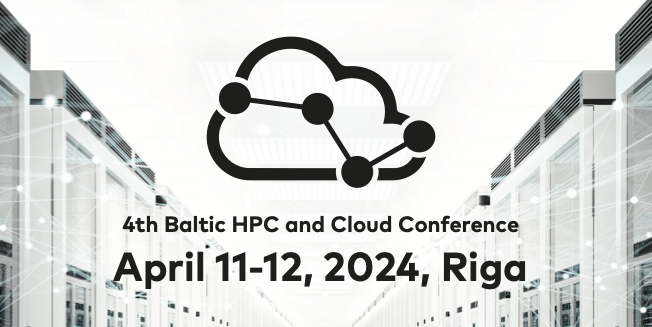Next week ENCCS is taking part in the 4th Baltic HPC and Cloud Conference in Riga! The conference will focus on the use of High-Performance Computing (HPC) and its increased use worldwide.
The European community
During the opening keynote, we will hear about recent and upcoming developments in HPC from Anders Dam Jensen, the Executive Director of the European High-Performance Computing Joint Undertaking. In addition to this, governmental representatives from Sweden, Estonia, and Latvia will give their perspective on why financial support to HPC is considered, why it should be given in the future, and what are the benefits of supporting the use of HPC in the long term.
The use of HPC can give significant advancements for the industry as well as small and medium enterprises, therefore Andreas Wierse (SICOS BW GmbH, Germany) will look into supercomputing as a possibility to revolutionize research, development, and innovation efforts. The session will continue with real success stories from industry representatives, for example, Zippy Vision (Latvia), Novian Technologies (Lithuania), and Scandinavia. A lot of Centres of Excellence (CoEs) are willing to collaborate with the industry and give their input and expertise, therefore everyone will be able to visit booths where CoEs, for example, BioExcel, EXCELLERAT P2, HIDALGO2, PlasmaPEPSC, and RAISE, will explain what they do, and introduce some future collaboration opportunities.
EDIHs and NCCs
With the rise of European Digital Innovation Hubs (EDIHs), small and medium enterprises (SMEs) can get support for digitalization, including HPC. We will hear some success stories from EDIHs who have supported SMEs in using the HPC. In addition to this, ENCCS will participate in a discussion with EDIHs and other National HPC Competence Centres (NCCs) on how to strengthen future collaboration and involve more SMEs in using the HPC.
The first day of the conference will conclude with a session that will look into cross-institutional access to HPC. With the increase of available HPC resources, the demand for cross-organizational, cross-border authentication and authorization, as well as authentication and authorization for the commercial and public sectors is increasing. For this reason, the conference dedicates a session to discussing potential challenges, requirements, and solutions to access HPC.
Growth and initiatives
On the second day, the conference will start with a keynote from Per Öster about a unique HPC ecosystem – LUMI – in Finland. It will continue with short presentations from three Baltic countries to see the growth and development of HPC and a discussion with the Nordic countries on potential next steps for future growth.
With HPC infrastructure advancements in Europe, we need to focus on training in HPC to improve skills and knowledge in using supercomputers. For this reason, the conference dedicates a session to new HPC developments in training and the advancements in the Baltic and Nordic countries, as well as in Europe to increase the use of HPC. Another session will focus on new developments in HPC interfaces and user support services. For those interested in HPC training, booths will be open all day long to discuss this in detail.
The conference will conclude with a section dedicated to Quantum Computing. We will see the main differences between HPC and Cloud Computing in a keynote by Mikael Johansson (CSC, Finland). This session will also look into the Quantum Computing landscape and achievements in Latvia, Denmark, Sweden, and Europe.
This is a wonderful event to meet face-to-face and discuss future collaborations, exchange ideas and success stories, as well as meet the HPC community from the Baltic sea region! The full conference program is available here: https://hpc.rtu.lv/4th-baltic-hpc-and-cloud-conference/?lang=en.
The conference is organized by National HPC Competence Centres (NCCs) in Latvia (SuperS), Estonia, Lithuania, ENCCS, Finland (CSC), and Denmark (DK-NCC) within the framework of the EuroCC 2 project.








